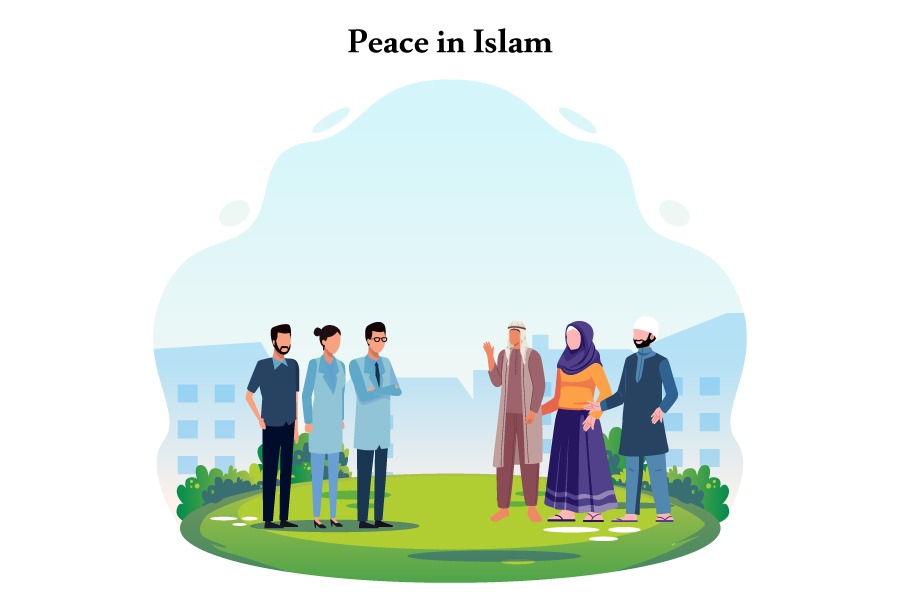Certainly! Islam, being one of the world’s major religions with over 1.8 billion followers globally, is a subject of significant interest and intrigue. However, it is essential to acknowledge that the majority of Muslims practice their faith peacefully and contribute positively to society. The debates and controversies surrounding Islam should not overshadow its rich history, diverse cultures, and profound contributions to art, science, philosophy, and civilization. One of the most common questions asked is whether Islam is a religion of peace. This article aims to explore the teachings of Islam, address misconceptions, and delve into the contributions of Islam to peace.
Is Islam a Religion of Peace?
Yes, it can be said that Islam is portrayed as a religion of peace. The Qur’an and Hadith emphasize peace in Islam, mercy, and compassion as fundamental values. The root word of Islam, ‘silm,’ means peace in Islam and one of God’s names is As-Salam, which also means peace. The Prophet Muhammad (PBUH) is described as a mercy to mankind, and the ideal society is referred to as Dar as-Salam, the house of peace in Islam. It is stated in the Quran
يَهْدِى بِهِ ٱللَّهُ مَنِ ٱتَّبَعَ رِضْوَٰنَهُۥ سُبُلَ ٱلسَّلَٰمِ وَيُخْرِجُهُم مِّنَ ٱلظُّلُمَٰتِ إِلَى ٱلنُّورِ بِإِذْنِهِۦ وَيَهْدِيهِمْ إِلَىٰ صِرَٰطٍ مُّسْتَقِيمٍ
By which Allāh guides those who pursue His pleasure to the ways of peace and brings them out from darknesses into the light, by His permission, and guides them to a straight path.
(AlQuran 5:16)
Islam places great importance on maintaining an atmosphere of peace and harmony. While Islam acknowledges the possibility of defensive war, it emphasizes avoiding conflict and seeking peaceful resolutions. Even in defensive situations, Muslims are encouraged to assess the potential outcomes and avoid war when peace in Islam is achievable.
It is essential to understand the principles of peace and avoidance to uphold the ideology of peace in Islam and foster a world of peaceful coexistence. However, it’s crucial to recognize that interpretations of religious texts and practices can vary among individuals and communities, and some may use religion to justify violence or misinterpret its teachings. As with any religion, it is essential to engage in constructive dialogue and promote understanding to ensure a peaceful world.
Concept of Peace in Islam
The concept of peace in Islam, known as “Salaam” in Arabic, holds a central and profound significance. Peace is not just the absence of conflict or war; rather, it is a comprehensive and harmonious state of being that encompasses physical, spiritual, and societal dimensions. The concept of peace in Islam is deeply intertwined with the core principles and teachings of Islam, emphasizing compassion, justice, and balance in all aspects of life.
-
Peace with Allah (God):
Muslims believe that ultimate peace comes from having a close and harmonious relationship with Allah. Peace in Islam is achieved through acts of worship, such as prayer, fasting, charity, and seeking forgiveness. Surrendering oneself to Allah’s will and living life by His guidance is seen as a path to inner peace and tranquility.
أَلَا بِذِكْرِ ٱللَّهِ تَطْمَئِنُّ ٱلْقُلُوبُ
surely it is in the remembrance of Allāh that hearts find peace.
(AlQuran 13:28)
-
Peace within oneself:
Islam emphasizes self-awareness, self-discipline, and the struggle against negative tendencies. Inner peace is achieved by purifying the heart from hatred, jealousy, and other harmful emotions, and by seeking contentment and gratitude. Islamic teachings encourage mindfulness and meditation on the remembrance of Allah, which brings serenity and tranquility to the soul.
-
Peace in relationships:
Islam stresses the importance of maintaining peace and harmony in all interactions. The Prophet Muhammad (peace be upon him) emphasized forgiveness, kindness, and empathy in dealing with others. Conflict resolution is encouraged, and reconciliation between disputing parties is highly valued. Muslims are encouraged to be just, fair, and respectful in their dealings with family, friends, neighbors, and even strangers.
-
Peace in society:
Islam advocates for a just and compassionate society, where everyone’s rights are protected and upheld. Islam condemns oppression, violence, and exploitation, and instead promotes social justice, equality, and the welfare of all individuals. The concept of “ummah,” or the global community of believers, encourages cooperation, mutual support, and peace among diverse peoples and cultures.
-
Peace with the environment:
Islam teaches stewardship of the earth and its resources. Muslims are encouraged to preserve and protect the environment, as all of God’s creation is considered sacred. Wastefulness, pollution, and overexploitation are discouraged, as they disrupt the natural balance and harm both the planet and its inhabitants.
-
Peace during conflicts:
While Islam values peace, it also recognizes that sometimes conflicts may arise. In cases of self-defense or protection of the oppressed, Islam permits the use of force but strictly within just and ethical limits. The aim is to restore peace in Islam and stability rather than perpetuate violence.
Contributions of Islam to Peace
Islam has made significant contributions to promoting peace throughout history. Some of the notable contributions include:
-
Tolerance and Coexistence:
Islam emphasizes the importance of living in harmony with people of different faiths and backgrounds. The concept of “dhimma” in Islamic law protected the rights of non-Muslim minorities, granting them religious freedom and autonomy. This spirit of tolerance contributed to the coexistence of diverse communities in many Islamic societies.
-
Social Justice and Welfare:
Islam places a strong emphasis on social justice and caring for the less fortunate. The concept of “Zakat,” or obligatory charity, and “Sadaqah,” voluntary giving, have played a crucial role in alleviating poverty and supporting those in need. Islamic societies historically established institutions like waqfs (endowments) that provided social services, such as hospitals, schools, and shelters, contributing to the well-being of communities.
-
Promotion of Dialogue:
The Prophet Muhammad (peace be upon him) encouraged dialogue and peaceful interactions with people of different beliefs. He engaged in treaties and agreements with various tribes and communities, setting an example for peaceful coexistence and conflict resolution.
-
Prohibition of Aggression:
Islam strictly prohibits aggression and violence against innocent people. The Quran states,
وَلَا يَجْرِمَنَّكُمْ شَنَـَٔانُ قَوْمٍ أَن صَدُّوكُمْ عَنِ ٱلْمَسْجِدِ ٱلْحَرَامِ أَن تَعْتَدُوا۟ ۘ وَتَعَاوَنُوا۟ عَلَى ٱلْبِرِّ وَٱلتَّقْوَىٰ ۖ وَلَا تَعَاوَنُوا۟ عَلَى ٱلْإِثْمِ وَٱلْعُدْوَٰنِ
“And do not let the hatred of a people for having obstructed you from al-Masjid al-Haram (in Mecca) lead you to transgress. And cooperate in righteousness and piety, but do not cooperate in sin and aggression.” (AlQuran 5:2).
This principle underscores the importance of promoting peace in Islam and avoiding conflicts.
-
Encouraging Forgiveness:
Forgiveness is considered a virtuous act in Islam. The Quran describes believers as those who
ٱلَّذِينَ يُنفِقُونَ فِى ٱلسَّرَّآءِ وَٱلضَّرَّآءِ وَٱلْكَٰظِمِينَ ٱلْغَيْظَ وَٱلْعَافِينَ عَنِ ٱلنَّاسِ ۗ وَٱللَّهُ يُحِبُّ ٱلْمُحْسِنِينَ
“Who spend [in the cause of Allāh] during ease and hardship and who restrain anger and who pardon the people – and Allāh loves those who strive for excellence;”
(Quran 3:134).
The teachings of Prophet Muhammad also emphasized the value of forgiving others and seeking reconciliation, fostering an atmosphere of peace in Islam and reconciliation.
-
Respect for Human Rights:
Islam recognizes the inherent dignity and worth of every individual, regardless of their race, ethnicity, or social status. Islamic teachings emphasize the protection of human rights, including the right to life, property, and religious freedom.
-
Environmental Stewardship:
Islam teaches that the earth and its resources are a trust of Allah, and Muslims are urged to be responsible stewards of the environment. The conservation and protection of nature are essential aspects of promoting peace in Islam and ensuring a sustainable world for future generations.
The Prophet Muhammad’s Teachings on Peace in Islam
Prophet Muhammad (peace be upon him), the last and final messenger of Islam, was a model of peace in Islam, compassion, and mercy. His teachings on peace are fundamental to the Islamic faith and have had a profound impact on shaping the Muslim perspective on conflict resolution, social harmony, and compassion toward all beings. Here are some key teachings of Prophet Muhammad on peace in Islam:
-
Avoiding Harm:
The Prophet Muhammad emphasized the principle of “no harm.” He taught that it is essential for Muslims to avoid causing harm to others in any form, be it physical, emotional, or psychological. This concept is derived from the Islamic injunction against aggression and transgression.
-
Promoting Forgiveness and Reconciliation:
Forgiveness is highly regarded in Islam, and the Prophet exemplified this trait throughout his life. He encouraged Muslims to forgive others and seek reconciliation, even in the face of personal grievances. The Prophet once said,
“Have mercy on those on the earth, and the One in the heavens will have mercy upon you.”
-
Peaceful Resolution of Conflicts:
The Prophet Muhammad promoted peaceful means of resolving disputes and conflicts. He encouraged dialogue, mediation, and arbitration to achieve reconciliation and justice. He said,
“Shall I not inform you of something more excellent in degree than fasting, prayer, and almsgiving? Making peace between people; for discord among people is a shaver.”
-
Respect for Non-Muslims:
The Prophet emphasized the importance of treating non-Muslims with kindness, respect, and fairness. He urged Muslims to uphold their commitments and agreements with people of other faiths, as long as they did not engage in hostility towards Islam.
-
Protecting the Weak and Vulnerable:
Prophet Muhammad was a champion of the rights of the weak and vulnerable members of society. He condemned oppression and exploitation and encouraged Muslims to defend the rights of orphans, widows, and marginalized individuals.
-
Avoiding Violence and Bloodshed:
The Prophet Muhammad discouraged unnecessary violence and bloodshed. He instructed his companions to avoid killing women, children, the elderly, and non-combatants during conflicts. Islam teaches that the taking of a single innocent life is akin to killing all of humanity.
-
Embracing Diversity:
The Prophet recognized the diversity of humanity and encouraged Muslims to live in harmony with people from different backgrounds and cultures. He said,
“People, beware of injustice, for injustice shall be darkness on the Day of Judgment.”
-
Emphasizing Prayers for Peace:
In his supplications and prayers, Prophet Muhammad often sought peace and protection from harm for himself and his followers. This reflects the deep-rooted desire for peace and well-being that he held for all humanity.
Misconceptions and stereotypes
Misconceptions and stereotypes about the concept of peace in Islam often arise due to the misinterpretation or misrepresentation of certain teachings or historical events. One common misconception is associating Islam with violence based on isolated acts of terrorism committed by a small minority. In reality, Islam’s core teachings emphasize peace, compassion, and justice, as exemplified by Prophet Muhammad’s peaceful diplomacy, his advocacy for non-violent conflict resolution, and his emphasis on coexistence with people of different faiths. Stereotypes also overlook the fact that the vast majority of Muslims worldwide are peaceful individuals who actively seek to promote peace in Islam and harmony in their communities, reflecting the true essence of Islam as a religion of peace.
Challenges and Extremism
Islam faces challenges from extremism, which represents a distortion of the religion’s teachings. Extremism arises when individuals misinterpret Islamic principles, resorting to violence, intolerance, and exclusion. These extremists often propagate a narrow and radical ideology, causing harm to others and tarnishing the image of Islam. To counter extremism, Muslims must uphold the true essence of peace in Islam and promote the values of compassion, tolerance, and understanding that the Prophet Muhammad exemplified. By embracing diversity, fostering dialogue, and addressing underlying socio-economic grievances, Muslims can combat extremism and work towards a peaceful and harmonious world as envisioned in Islamic teachings.
Conclusion
In conclusion, it is essential to recognize that Islam, like any major religion, has diverse interpretations and followers who practice their faith peacefully. While debates and misconceptions surrounding Islam persist, it is crucial to focus on its rich history, cultural contributions, and profound teachings on peace in Islam. Islam’s core principles emphasize peace, compassion, and coexistence with people of different faiths. Prophet Muhammad’s teachings exemplify the importance of forgiveness, dialogue, and the avoidance of violence. However, challenges arise from extremism, which misrepresents Islam and its teachings. To foster a more peaceful world, it is vital to promote a true understanding of Islam, encourage tolerance and respect for diversity, and address the underlying issues that fuel extremism. By embracing the concept of peace in Islam and working towards mutual understanding, Muslims and non-Muslims alike can contribute to creating a more harmonious and peaceful global society.

















